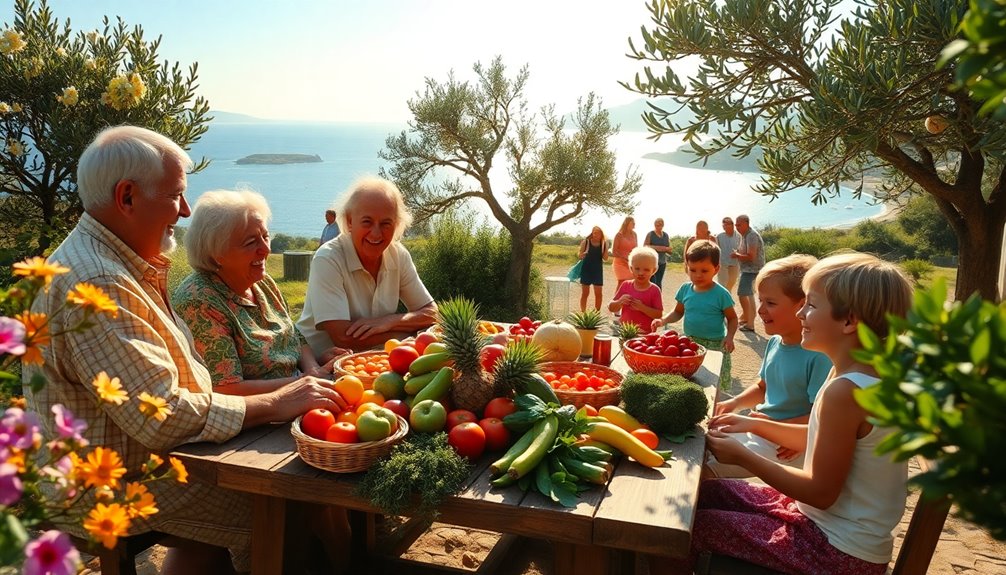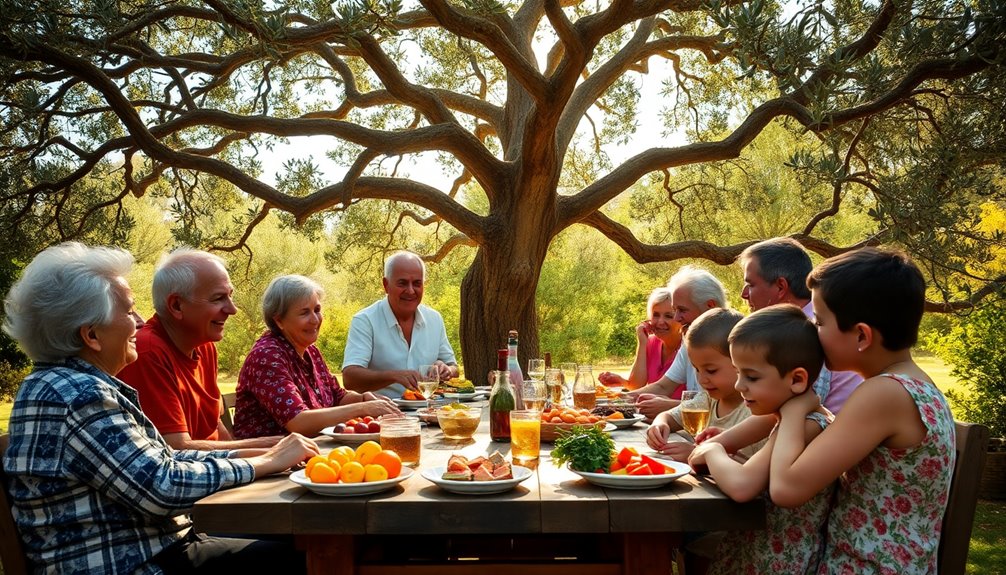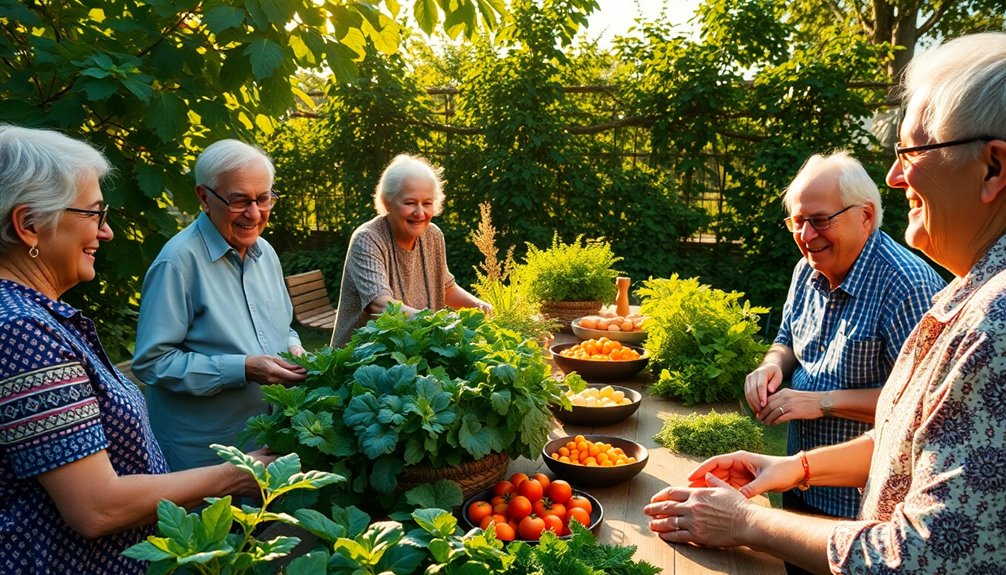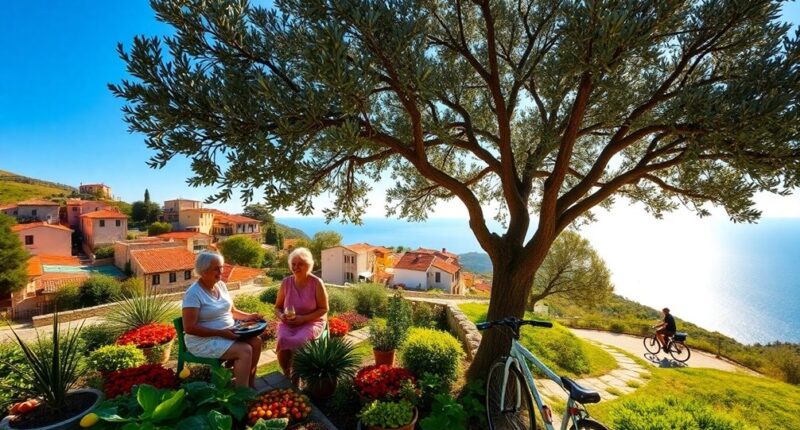A Blue Zone lifestyle means making choices that boost longevity. You'll focus on a plant-based diet rich in fruits, vegetables, and legumes, while limiting meat. Natural movement is key, like walking or gardening instead of structured exercise. Building strong social connections through shared meals and community ties enhances your mental health. Finally, nurturing a sense of purpose in daily life can greatly improve your well-being. There's so much more to discover about these practices!
Key Takeaways
- Blue Zone lifestyles emphasize a predominantly plant-based diet, rich in fruits, vegetables, whole grains, and legumes.
- Regular physical activity is integrated into daily routines, promoting natural movement like walking and gardening.
- Strong social connections, including shared meals and community involvement, enhance emotional well-being and support longevity.
- A sense of purpose is crucial, linked to lower mortality rates and increased life satisfaction.
- Practices like portion control and calorie restriction contribute to better health and weight management.
Understanding Blue Zones

When you think about longevity, Blue Zones might come to mind as remarkable places where people live well into their centenarian years. Identified by Dan Buettner, these regions—like Okinawa, Sardinia, and the Nicoya Peninsula—showcase how lifestyle factors greatly impact lifespan.
About 20% to 30% of longevity variations stem from choices such as diet, exercise, and social networks, rather than just genetics. In Blue Zones, you'll find a mainly plant-based diet, regular physical activity woven into daily routines, and strong social connections that foster a sense of purpose in life.
The Power 9 principles encapsulate these traits, illustrating how simple lifestyle adjustments can lead to healthier, longer lives. Embracing these elements can help you enhance your own longevity.
Dietary Habits of Blue Zone Inhabitants

Blue Zone inhabitants thrive on dietary habits that prioritize plant-based foods, which greatly contribute to their longevity.
In these regions, you'll find that Blue Zones eat about 95% plant-based diets, rich in fruits, vegetables, whole grains, and legumes. Beans, known as the No. 1 longevity food, are consumed regularly, promoting longer life and better health.
While fish is enjoyed in places like Icaria and Sardinia, meat is eaten sparingly—only about five times a month.
Portion control and mindful eating are key practices, with traditions like the Okinawan "hara hachi bu," encouraging you to stop eating when 80% full.
Additionally, diets are low in added sugars and processed foods, focusing on natural sweetness and nutrient-dense choices.
Lifestyle Practices Contributing to Longevity

Integrating healthy lifestyle practices into daily life plays an essential role in the longevity seen among Blue Zone inhabitants.
You'll find that many residents engage in natural movement, like gardening and walking, which keeps them active and promotes longer life.
Practicing calorie restriction, such as the Okinawan "hara hachi bu," where you eat until 80% full, encourages better health and weight management.
Prioritizing sleep, including afternoon naps, helps them maintain physical and mental well-being.
A strong sense of purpose drives these individuals, reducing mortality rates and enhancing life satisfaction.
Additionally, the community's social networks foster emotional health, creating a supportive environment that combats loneliness and promotes moderate, shared meals, all contributing to their exceptional longevity. Engaging in regular physical activity, such as hula hooping for weight loss, can further enhance their fitness levels and overall well-being.
Social Connections and Their Impact

Healthy lifestyle practices aren't just about physical habits; they also encompass the essential social connections that Blue Zone inhabitants cultivate.
These strong social networks thrive through community activities, providing emotional support and enhancing mental health. Shared meals with family and friends are common, fostering bonds over nutritious food and good conversation.
In Okinawa, small support groups called "moais" emphasize the importance of these ties, linking them to lower mortality rates. Additionally, religious involvement contributes to reduced depression and increased social support.
Engaging in community gatherings and promoting intergenerational living helps combat loneliness, building strong social ties that greatly impact health and life expectancy. Embracing these connections can lead to a longer, healthier life.
Cultivating a Sense of Purpose

Finding a sense of purpose can greatly influence your overall well-being and longevity. In Blue Zones, this concept, known as "ikigai," is linked to lower mortality rates and improved mental well-being.
Engaging in fulfilling activities not only enhances life satisfaction but also strengthens community ties and relationships.
- Embrace personal passions to boost happiness.
- Participate in community service for deeper connections.
- Nurture relationships with family and friends.
- Engage in activities that bring you joy.
Frequently Asked Questions
What Is the 80% Rule in Blue Zones?
The 80% Rule, or "hara hachi bu," encourages you to stop eating when you feel about 80% full.
By practicing this, you can promote moderation and prevent overeating, helping you maintain a healthy weight.
Eating slowly and mindfully allows you to tune into your body's signals, leading to better portion control.
This simple habit can greatly reduce your caloric intake, supporting long-term health and potentially lowering the risk of age-related diseases.
Do People in Blue Zones Eat Eggs?
Yes, people in Blue Zones do eat eggs, but they're consumed in moderation.
You'll find that many inhabitants include eggs occasionally, often just a few times a month.
Their diets prioritize plant-based foods like vegetables, legumes, and whole grains, making eggs more of a supplemental protein source rather than a staple.
This balanced approach emphasizes variety and nutrient density, ensuring eggs play a minor role in their overall nutritional intake.
How Many Hours of Sleep Do People in Blue Zones Get?
When it comes to sleep, you can't burn the candle at both ends.
People in Blue Zones typically aim for about 7-8 hours of quality sleep each night. They also embrace daytime naps, adding extra rest to their routines.
This balance not only keeps their energy levels high but also promotes mental clarity and overall well-being, contributing to a healthier, longer life.
Prioritizing sleep is key to thriving in these vibrant communities.
Do Blue Zones Drink Alcohol?
Yes, people in Blue Zones do drink alcohol, particularly red wine.
They typically enjoy 1-2 glasses a day, integrating it into their daily routine. This moderate consumption is linked to improved cardiovascular health and lower mortality rates.
It's not just about the drink; it's often part of social gatherings and shared meals, enhancing connections with family and friends.
Conclusion
Embracing a Blue Zone lifestyle isn't about strict diets or exhausting routines; it's about small, joyful changes that enhance your daily life. You don't have to live in a Blue Zone to reap the benefits—simple adjustments like enjoying meals with loved ones or taking regular walks can make a huge difference. So, why not start today? Find what brings you joy and purpose, and watch how your overall well-being transforms for the better.









